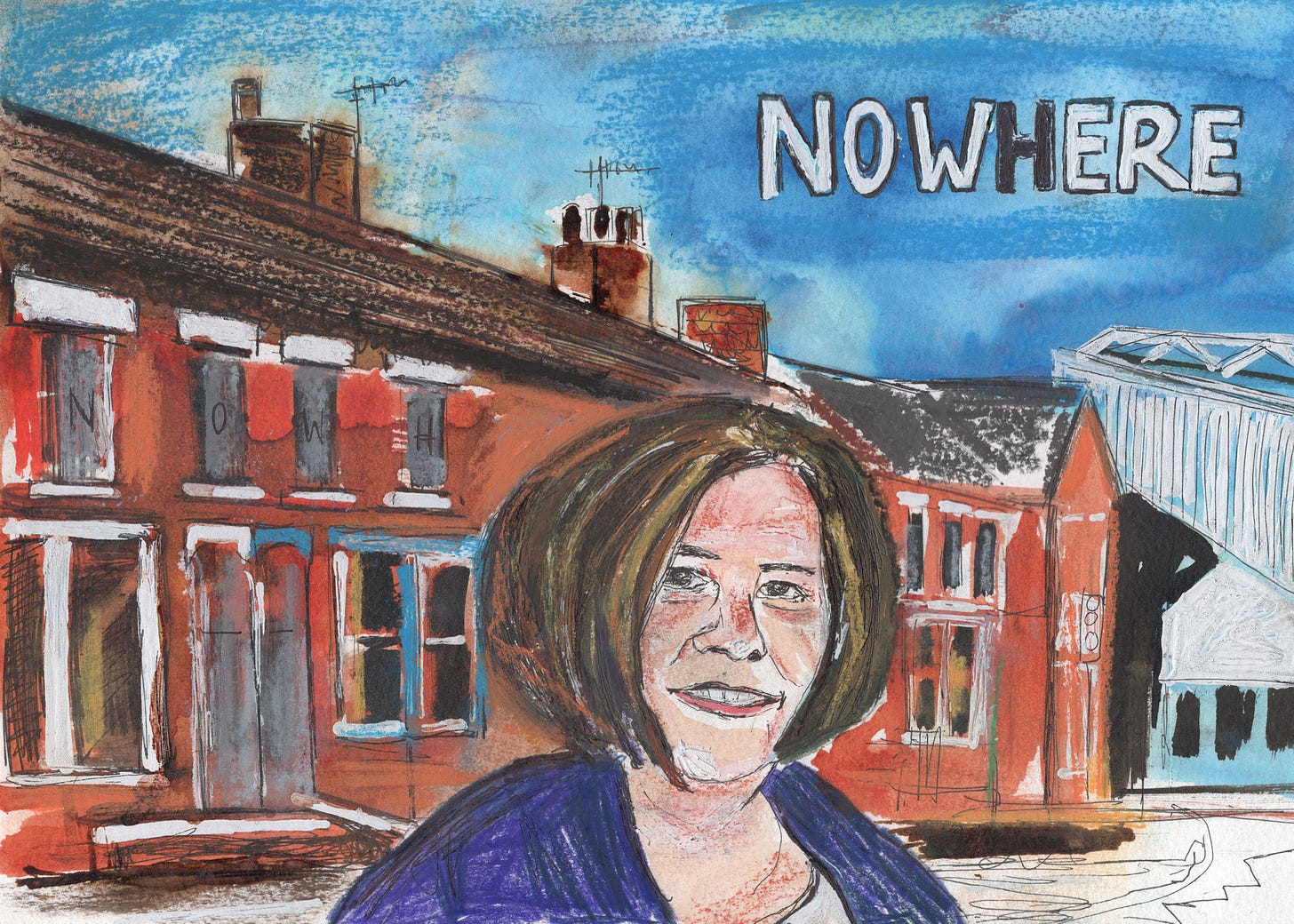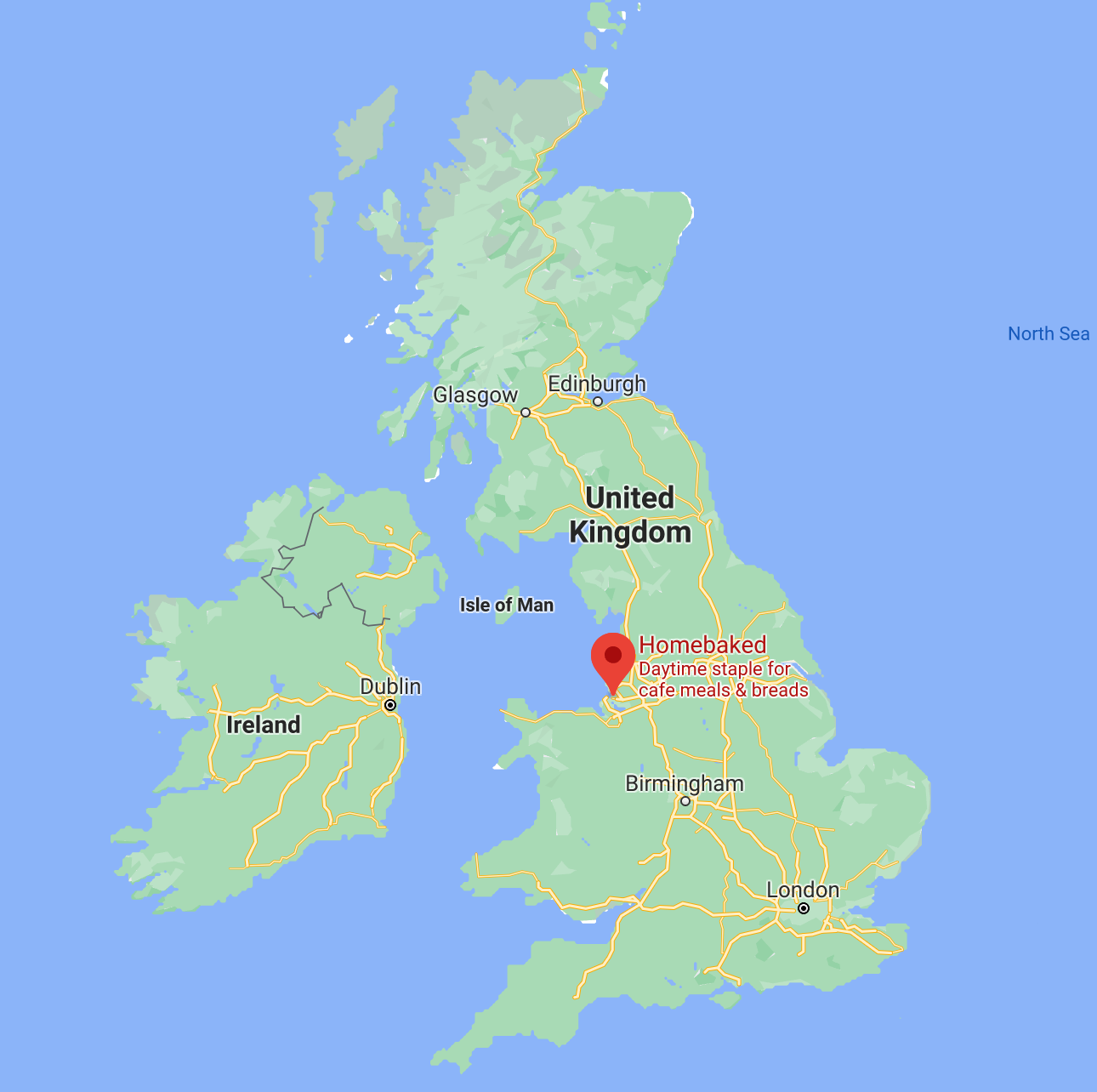Catherine Simmons and Homebaked
A terrace opposite Anfield Stadium shows what empty highstreets could become

High streets are facing a great reckoning. It’s been coming for a while: the slow domino fall of the big names – Sports Direct, Debenhams, Topshop – and now a year of shuttered doors, when even those most ardent rack-riflers, the people who used to queue at 5am for the Boxing Day sale at Next, have been forced to get their retail hit online. I read something profoundly depressing in the Financial Times this weekend: that some 15m square feet of empty space will open up on high streets this year, to be filled with even more discount stores and “experiential leisure” companies, offering trampolining and themed go-carting.
It doesn’t have to be that way. Below, Catherine tells us about a high street opposite the Liverpool football stadium that was hollowed out by the government’s Housing Market Renewal policy. After 2002, residents were removed from their homes under the guise of regeneration – plans that stalled in 2008, leaving swathes of streets empty. The sweet shop, the dairy, the grumpy haberdasher: everything went along with the people who had called Oakfield Road their home.
Instead of starting from what was lost, the residents formed the Homebaked Community Land Trust and counted their assets: proximity to the football club, plenty of empty space, and people – people with ideas that put go-karting and trampolining to shame. Catherine, project manager for Homebaked CLT, tells us how she got involved in the project which is about to start renovating nine terraces as energy-efficient homes, space to incubate businesses and gathering places where people don’t have to pay just to spend time with others indoors.
Interviewed on May 12, 2019
In 2017, I decided I wanted to go self employed. I'd worked in housing and community regeneration for years and years. Everything just kept changing, which was fine, but it took you away from what you were supposed to be doing. I thought, if I'm going to work till my late 60s, I'm going to be doing something that I feel passionate about. So I went part time on a youth project, which gave me time to look at what else was out there. I've worked in North Liverpool for years and seen the energy around community-led projects. So when I saw this opportunity, I knew I wanted to give it a go.
That's why I was interested in this job: you're learning all the time. It's different nearly every day and you stretch yourself, there's no chance to get bored. You do more hours than you’re supposed to do. A friend of mine said, “I don't think that could be self-disciplined enough to be self-employed. And I just laughed, because I thought actually that's the last thing you'd describe me as – but I realised that it’s because it's interesting. A lot of it's like a puzzle, when you're trying to find solutions to stuff. You believe in it. So you find the time to do the job. And all the other bits that sit around it, because there's nobody there to do those things.
Britt and I work well together in that sense of, you know, if one is stretched, and got crazy deadlines, then the other will go, “What can I do?” And we have a fantastic board. We've got some new members on in the last six months, that have given new energy to the whole thing and a new perspective.
The point of the project is to put the buzz back in the high street and to retain assets in the community.
The terrace is a physical manifestation of what the community land trust is about. In that sense, it's going to help increase membership, increase people's belief in what communities can do. Especially in an area that's been done to for a long time. It's about showing that community-led doesn't mean poor standards. It's going to be quality. It’s got people's priorities at the heart of the design. And that will be our standard going forward.
There was a point when a feasibility study was done about demolition and new builds for this site. That was what the preferred route was for the city at the time. But then the climate changed. And there was a bit more of an interest in refurbishment, which was always the preferred route for the community. If you think about it: people were asked to move out and then moved on, then to find out that we're refurbishing it now… But the community's reaction has been really very positive.
Everybody had stories. A lot of the discussion is around what people want to see here.
And so people start talking about what the high street meant to them previously. And you've got all these little photographs of what it used to look like: haberdashery stores, a sweetshop, the dairy, the grumpy upholsterer. People came in and started telling their stories. That process was just lovely for for everyone. But it also stimulated conversations about what people wanted.
At the square at the end of the terrace there's a big container, which is all kitted out growing microgreens. Testing out different ideas. They're doing horticulture training, but also it's acting as a bit of recruitment into the project. And, and they have explored all sorts of different things. They want to be a viable community business. And what they've come up with in terms of what could be successful is a microbrewery.
I've worked in the North End a lot. And, and they're all different communities, but I think they're just really quite strong communities with an attitude, which I like. That’s a great environment for a community land trust to develop in.
Interviewed on February 16, 2021
The challenge we had last year is that everyone switched to: “How do we deliver during Covid?” The mainstream grant programmes shut down and focussed on the Covid emergency response, around things like food banks and immediate need, and those funding streams have only really just started to reopen from autumn last year. But if I’m honest that breathing space really helped us to get to grips with where we were at and recognise that this is a business as well.
It’s about community, but this is a business.
There’s no denying the last 12 months haven’t been the same, but we have Liverpool Football Club right on the doorstep. That creates opportunities for the service industry, for reputation: it’s about looking at what’s on your doorstep that you can benefit from. What is it about your offer that’s different from everyone else? I took a walk around town on Sunday and every shop where I saw a queue outside was a bakers. It just shows there’s been a real shift in terms of what people want this year.
A plus is that there has been a national argument for community-led work, and the value of it. We’re members of the regional community-led housing hub which is just launching this weekend, Breaking Ground. They have been incredibly supportive. The hubs are dotted around the country, there’s this whole network that’s been created of mutual support, sharing advice and information, that’s been really helpful. There has been an element of Covid that’s encouraged people to look outwards, get inspired and take time out – especially as you can do virtual visits more easily.
I tend to describe it as a jigsaw puzzle that we’re putting together.
We’re partnering with a Housing Association for the development who will draw funding from Homes England and manage the terrace until Homebaked is ready to take it on, from completion. That’s the stage that we’re at at the moment: we have gone out to tender and we’re about to interview contractors. That’s one piece of the puzzle. The other is finance, another is that we have to become a registered provider of affordable housing.

There’s a lot that’s come out of the last 12 months about how communities respond much quicker to the needs in their area, how they can connect to the most excluded. A lot of people have started to look at the wider social value of what they are doing. And the green agenda: our board appointed Urbed, our architects, because of their track record on decarbonisation. But when they started working with the residents, it was about: we need to address fuel poverty. Those two priorities marry perfectly so the fabric first approach, the alternative heating methods that will be delivered through the terrace, are delivering on a whole raft of agendas.
Finance is always a massive barrier, there’s a lot of rhetoric about what should be done but it’s not backed with the resources. It’s helped us that the City have been so brilliant. They have recognised the value of community ownership in transferring the terrace to us, but in other places it might be a clearance site on a high street and then it might be about clearance costs.
You can get so tied up in chasing the funding that you need to be careful not to lose the vision. You need to stay connected to the community and its aspirations.
The ultimate vision is that Homebaked get to own the terrace, including space for an expansion for the existing Homebaked co-operative bakery, new business space for Homegrown Collective, which came out of the horticulture volunteering project, and a small space for the community land trust to keep us connected on the ground but also to start us developing the community business incubation model. That the vision going forward: it’s all about being able to say, in a couple of years, let’s go a bit further down Oakfield Road.
Footnotes
See Homebaked for yourself on February 27 at Breaking Ground, a community-led housing festival and the launch of the Liverpool City Region’s hub for projects of this kind. Groups from the region are putting on a week of events that anyone is welcome to attend. Next week, we’re going to Morecambe to meet some dear friends of mine. In the meantime, you can help by liking the post, commenting below or forwarding to someone else. See you soon!




